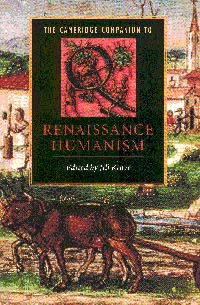Book contents
- Frontmatter
- 1 The origins of humanism
- 2 Classical scholarship
- 3 Humanism in script and print in the fifteenth century
- 4 The humanist reform of Latin and Latin teaching
- 5 Humanist rhetoric and dialectic
- 6 Humanists and the Bible
- 7 Humanism and the origins of modern political thought
- 8 Philologists and philosophers
- 9 Artists and humanists
- 10 Vernacular humanism in the sixteenth century
- 11 The new science and the traditions of humanism
- 12 Humanism and Italian literature
- 13 Humanism and English literature in the fifteenth and sixteenth centuries
- 14 Humanism and seventeenth-century English literature
- A guide to further reading in English
- Biographical index
14 - Humanism and seventeenth-century English literature
Published online by Cambridge University Press: 28 May 2006
- Frontmatter
- 1 The origins of humanism
- 2 Classical scholarship
- 3 Humanism in script and print in the fifteenth century
- 4 The humanist reform of Latin and Latin teaching
- 5 Humanist rhetoric and dialectic
- 6 Humanists and the Bible
- 7 Humanism and the origins of modern political thought
- 8 Philologists and philosophers
- 9 Artists and humanists
- 10 Vernacular humanism in the sixteenth century
- 11 The new science and the traditions of humanism
- 12 Humanism and Italian literature
- 13 Humanism and English literature in the fifteenth and sixteenth centuries
- 14 Humanism and seventeenth-century English literature
- A guide to further reading in English
- Biographical index
Summary
Because he has 'watch'd men, manners too / Heard what times past have said, seen what ours doe', the humanist antiquary earns the praise of the humanist poet. The balanced rhythm of attention that Ben Jonson here ascribes to John Selden is an idealization of what might be called the neoclassical habit of mind, with its alternation between censorious inspection of the present and studious review of the past. Other rhythms support this central one - of collection and dissemination, exemplification and dismissal, learning and teaching:
Which grace shall I make love to first? your skill,
Or faith in things? or is't your wealth and will
To instruct and teach? or your unweary'd paine
Of Gathering? Bountie in pouring out again?
What fables have you vext! what truth redeem'd!
Antiquities search'd! Opinions dis-esteem'd!
Impostures branded! and Authorities urg'd!
What blots and errours, have you watch'd and purg'd
Records, and Authors of! how rectified /Times, manners, customes! ...
Jonson represents Selden's classicism as an ideal personal discipline, an ethics. Oddly, however, the ethical poise asserted here is represented without perfect aesthetic poise; the poem seems a less balanced thing than its subject. It is not just the unfortunate effect of the hectic exclamation marks; it is more a matter of the Ciceronian exclamations, with their ellipses constricting the praise as much as the repetitions extend it.
- Type
- Chapter
- Information
- The Cambridge Companion to Renaissance Humanism , pp. 269 - 293Publisher: Cambridge University PressPrint publication year: 1996
- 1
- Cited by

